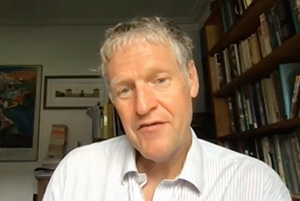|
Continuing our series of talks and discussions about issues in Scotland that affect the Jewish Community, SCoJeC was delighted to host a well-attended panel discussion about religious hatred, with the main focus on Scotland’s notorious record for sectarianism, recent concerns about rising Islamophobia, and the report just published by the Community Security Trust (CST) reporting the highest-ever monthly number of antisemitic incidents.
Our panellists were all experts on the subject. Mark Gardner, originally from Glasgow, is Chief Executive of the CST, and gave the keynote speech at the European Union Colloquium on antisemitism and anti-Muslim hate; Prof Duncan Morrow chaired the Scottish Government’s independent advisory groups on tackling Sectarianism and on Hate Crime, Prejudice, and Community Cohesion, and is currently Director of Community Engagement at Ulster University; and Anas Sarwar MSP, who was unable to join us but sent a pre-recorded message, established the Scottish Parliament Cross-Party Group on Tackling Islamophobia, which had recently published a report highlighting alarming levels of anti-Muslim prejudice, hatred, and bigotry.

|

|
The speakers began by reflecting on their personal experiences of prejudice in Scotland, and Duncan reflected on how sectarianism can affect people in their day to day lives, noting that, overall, “we have a problem with indifference”. Mark spoke about his experiences as a young boy attending school in Glasgow, and said that incidents of antisemitic abuse were not uncommon as he travelled to and from school, although he commented that he had only recognised these abuses as antisemitic as he grew older.
The panel then went on to discuss how international issues can play a role in escalating tensions in Scotland, specifically noting the recent rises in antisemitism and extremism during conflict in the Middle East. Mark referred to the recent CST research briefing The Month Of Hate: Antisemitism and extremism during the Israel-Gaza conflict, and this prompted a discussion of how communities can come together to tackle injustice and prejudice for a safer more inclusive society, including joint work with TellMAMA, an independent organisation that monitors and works with policy-makers on tackling anti-Muslim hatred.

|
Duncan commented that violent attacks are often seen as "the end of the iceberg" and not the beginning, which showed the need for efforts to prevent these atrocities long before they take place, and that led to a discussion of what the priorities should be in legislating against hate crime. Duncan and Mark agreed that the law needs both to be strengthened and implemented more robustly in order to protect and safeguard communities, which in turn requires legislators to be sensitive to the experiences of each community. Duncan said, however, that the law merely sets a basic standard and that society should aspire to achieve more, stating that the "law is not the ceiling, it’s the floor".
Many of those attending commented on the importance of protecting young people from hate crime, and on the role of education and youth work in helping them to reject and unlearn any unconscious bias and prejudice.
Maureen Sier, Director of Interfaith Scotland, summed up the "rich, informative, and challenging" debate, thanking the speakers for having raised so many challenging issues, and emphasising the importance of building solidarity between communities. "There was truth spoken tonight," she commented, "so many key points that resonated with everyone here." |